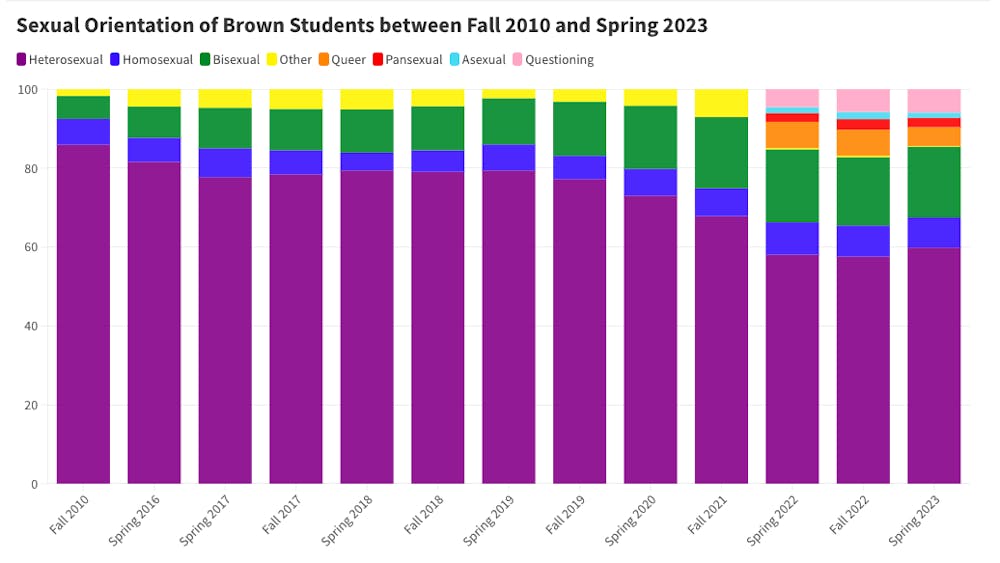The Herald’s Spring 2023 poll found that 38% of students do not identify as straight — over five times the national rate. Over the past decade, LGBTQ+ identification has increased across the nation, with especially sharp growth at Brown.
This Pride Month, The Herald reviewed data from its semesterly polls and spoke with current students to investigate how the LGBTQ+ community on campus has evolved over time.
The Herald first surveyed sexual orientation in its Fall 2010 poll, in which around 14% of respondents answered that they were not straight. That number has more than doubled since.
Jacob Gelman ’25 noticed “a rise in openly identifying queer individuals.”
Brown’s queer community is much greater than the national average among adults. Gallup polls from 2022 found that only 7.2% of adults — and 19.7% of those aged 18 to 25 — identified as LGBTQ+.
For Josephine Kovecses ’25, the difference between national LGBTQ+ demographics and Brown LGBTQ+ demographics is not a challenging puzzle to solve.
“Queer people haven’t been able to be open in their identifications for that long,” Kovecses said. “So it’s exciting that the numbers are growing and that queer people are able to be open in particular at Brown.”
Since Fall 2010, Brown’s LGBTQ+ population has expanded considerably. The gay or lesbian population has increased by 26% and the percentage of students identifying as bisexual has increased by 232%. Students identifying as other sexual orientations within the LGBTQ+ community have increased by 793%.
Since 2010, the range of LGBTQ+ identifications students are able to self-report on the Herald’s semesterly poll has expanded. In Spring 2022, The Herald expanded its options for describing sexual orientation to better represent the Brown community, including “Queer,” “Pansexual,” “Asexual” and “Questioning/Unsure” as options.
Notably, of those who self-identified as LGBTQ+, only 22.9% of students described themselves as gay or lesbian in the Herald Spring 2023 poll, down from 46% in Fall 2010. Bisexual was the most common answer among LGBTQ+ respondents with 53.7% of LGBTQ+ responses.
Students were also more likely to identify with a more diverse range of sexual orientations besides homosexual and bisexual in recent years.
The Herald did not poll about gender identity in detail until Spring 2022, offering little information about the proportion of non-cisgender students on campus. Nonetheless, in Spring 2023, 3.1% of poll respondents identified as non-binary with an additional 1.8% identifying as genderqueer. A 2021 Williams Institute study found that in the United States about 1.2 million adults — or 0.46% — identified as non-binary.
Read more from The Herald's Pride 2023 Special Issue.

Ryan Doherty is the managing editor of digital content and vice president of The Herald's 135th editorial board. He is a junior from Carmel, NY who is concentrating in chemistry and economics. He previously served as a university news and science & research editor, covering faculty and higher education.

Sofia Barnett is a University News editor overseeing the faculty and higher education beat. She is a junior from Texas studying history and English nonfiction and enjoys freelancing in her free time.





